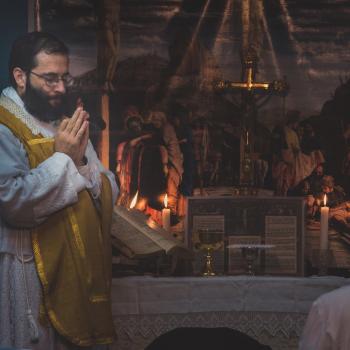Recently concerns have arisen over the bishops following historical pastoral practice and insisting that people repent before the Eucharist. Those who insist on going to Communion when they know they should not are trying to weaponize the Eucharist for their goals. The bishops are not weaponizing the Eucharist.
I explain below why this is weaponizing, the long tradition of the Church, and why the arguments of certain politicians fail. Weaponization is taking the Eucharist, God himself, and using it not for worship or for God, but for some other end: adapting it to become a weapon.
Receiving When One Shouldn’t Is Weaponization

When anyone knows that they should not go to Communion, but still go, they commit a sacrilege. There must be some reason we are receiving when we shouldn’t. Generally, we want something like appearing as a better Catholic than we are, wanting to avoid awkwardness, out of fear others might think bad of us, or some such end we seek for ourselves: at least that’s what was going in my mind when I did so as a teenager and others have told me was going on in their mind when they received unworthily. This is a weaponization of the Eucharist for our own ends. This applies for any of us who has committed a mortal sin or a person who has created grave public scandal due their positions contrary to the Catholic faith and natural law.
The Eucharist is Jesus himself, so should never be used for other ends. In fact, the Catechism says He is “the source and summit of the Christian life.” (1324) Misusing a person as a means not an end is always bad, but more so when it is a divine person like Jesus Christ.
The Church has canon 916 that suggests such people, even if the issue is not public, abstain from the Eucharist. Canon 915 then instructs those whose actions present public grave scandal for the Church to be denied Communion if they choose not to follow 916 on their own.
Such misuse can be called “weaponizing” the Eucharist. It is using the Eucharist as tool to win in social or political situations.
History of Denying Communion
Denying the Eucharist has been a practice for most of Christian history. The goal is helping people repent and be properly disposed. Some argue that we should not judge, but the Church has never judged anyone as perpetually unable to receive the Eucharist: she just asked people to prepare properly with repentance.
The three most well-known examples of denying politicians the sacraments all resulted in repentance and a change of ways. I hope this does the same.
First, we have St. Ambrose who excommunicated Emperor Theodosius after the Massacre of Thessalonica. Theodosius either ordered it or did not prevent the massacre, but the Archbishop of his capital (Milan) required penance before reinstating him.
Second, Gregory VII excommunicated Henry IV of the Holy Roman Empire for investing (appointing) bishops as a layman. Henry IV prostrate himself outdoors during a blizzard for three days in Canossa before the excommunication was lifted.
Third, Henry II of England was excommunicated for his involvement in St. Thomas Becket’s death. Henry made a suggestion that others took as an order. Henry did public penance involving hundreds of blows to the back in front of the Cathedral before the excommunication was lifted.
Politicians’ Arguments Fail
Let’s examine the claim of certain politicians sentence by sentence:
We believe the separation of church and state allows for our faith to inform our public duties and best serve our constituents. The Sacrament of Holy Communion is central to the life of practicing Catholics, and the weaponization of the Eucharist to Democratic lawmakers for their support of a woman’s safe and legal access to abortion is contradictory. No elected officials have been threatened with being denied the Eucharist as they support and have supported policies contrary to the Church teachings.
Their first sentence is good, as our faith should inform our politics.
A Supposed Contradiction
Their second sentence is great up to the comma as the Eucharist is central to our faith. After the comma, this sentence makes multiple errors.
- The first error is to assume this is about party affiliation. It is because they support a publicly scandalous position – that we should legally be able to kill babies – contrary to Catholicism and natural law. Let me offer two examples to show this. First, John Bel Edwards, the current Democratic governor of Louisiana would not be asked to refrain from Communion. He described his pro-life view as: “That’s the way I was raised. That’s what my Catholic Christian faith requires.” On the other hand, Susan Collins, a current Republican senator from Maine who claims to be Catholic has expressed a publicly scandalous view in support of abortion multiple times so should be denied Communion.
- Second, they claim this is weaponization of the Eucharist when it is in fact protecting the Eucharist from weaponization by them. Christine Rousselle of Catholic News Agency warns of the upcoming danger: “I’m just bracing myself for a smug video from a politician presenting themselves for communion to a priest who doesn’t recognize them and my heart is broken.” And follows this with “DoN’t WeApOnIzE tHe EuChArIsT” showing how ridiculously ironic this idea is.
- Third, there is no such thing as “safe” abortion as a child always dies. The goal should always be to make abortion unthinkable and never done but making it illegal for people to abort others’ children is a necessary step in the right direction.
- Fourth, they claim some contradiction when the real contradiction is them presenting themselves for Communion as good Catholics while pushing forward the culture of death.
No Politicians?
Third, they claim no elected politicians have ever been threatened or denied the Eucharist. That claim is contrary to facts:
- In 2007, the bishops of Latin America noted that politicians should be aware they cannot receive Communion while supporting abortion, euthanasia, and other grave crimes against life or family. (436)
- In 2007, Bishop Thomas Tobin of Providence told a congressmen from his diocese not to receive Communion.
- In 2007, Mexican legislators were denied Communion over legalizing abortion and Pope Benedict XVI supported this move.
- In 2008, Kathleen Sebelius, then Kansas governor, was asked not to present herself for Communion by her bishop.
- In 2010, the Spanish bishops stated politicians who voted for a law easing abortion restrictions should not present themselves for Communion.
- In 2012, the bishops of Uruguay said politicians who voted to decriminalize abortion should not receive the Eucharist.
Conclusion
Let’s not weaponize the Eucharist. Let’s protect it from politicians and others presenting public scandal who want to weaponize it for their ends. The Eucharist is God and should be protected. Canons 915 and 916 are law, not suggestions.
Note:s
- Sorry, this came out later than I expected. I’ve been busy with other things in my life.
- If you appreciated this, please support me on Patreon so I can write more analysis from the perspective of Catholic theology.












